Difference between revisions of "Language/Multiple-languages/Culture/Religions-and-Folklores:-Objects"
< Language | Multiple-languages | Culture
Jump to navigation
Jump to search
| (5 intermediate revisions by the same user not shown) | |||
| Line 36: | Line 36: | ||
|- | |- | ||
| | | | ||
* ''bàozhú'' 爆竹 [cmn] | * ''bàozhú'' 爆竹 爆竹 [cmn] | ||
|firecrackers used to scare off evil spirits at New Year | |firecrackers used to scare off evil spirits at New Year | ||
| | | | ||
| Line 62: | Line 62: | ||
* ''chos kyi 'khor lo'' ཆོས་ཀྱི་འཁོར་ལོ་ [bod] | * ''chos kyi 'khor lo'' ཆོས་ཀྱི་འཁོར་ལོ་ [bod] | ||
* ''dharmachakra'' धर्मचक्र [san] | * ''dharmachakra'' धर्मचक्र [san] | ||
* ''fǎlún'' 法輪 [cmn] | * ''fǎlún'' 法輪 法轮 [cmn] | ||
* ''tam-má-jàk'' ธรรมจักร [tha] | * ''tam-má-jàk'' ธรรมจักร [tha] | ||
|symbol of Buddhism; originally farming tool and weapon | |symbol of Buddhism; originally farming tool and weapon | ||
| Line 73: | Line 73: | ||
|- | |- | ||
| | | | ||
* ''chuáng'' 幢 [cmn] | * ''chuáng'' 幢 幢 [cmn] | ||
* ''dhvaja'' ध्वज [san] | * ''dhvaja'' ध्वज [san] | ||
* ''rgyal mtshan'' རྒྱལ་མཚན [bod] | * ''rgyal mtshan'' རྒྱལ་མཚན [bod] | ||
| Line 94: | Line 94: | ||
|- | |- | ||
| | | | ||
* ''fúlù'' 符籙 [cmn] | * ''fúlù'' 符籙 符录 [cmn] | ||
|talismanic slip | |talismanic slip | ||
| | | | ||
| Line 113: | Line 113: | ||
* ''dril bu'' དྲིལ་བུ་ [bod] | * ''dril bu'' དྲིལ་བུ་ [bod] | ||
* ''ghaṇṭā'' घण्टा [san] | * ''ghaṇṭā'' घण्टा [san] | ||
* ''jiānzhì'' 犍稚 [cmn] | * ''jiānzhì'' 犍稚 犍稚 [cmn] | ||
|bell | |bell | ||
| | | | ||
| Line 158: | Line 158: | ||
|- | |- | ||
| | | | ||
* ''hù'' 笏 [cmn] | * ''hù'' 笏 笏 [cmn] | ||
* ''shaku'' 笏 [jpn] | * ''shaku'' 笏 [jpn] | ||
|ritual scepter; originally used by officials as tablet for recording notes and orders | |ritual scepter; originally used by officials as tablet for recording notes and orders | ||
| Line 185: | Line 185: | ||
| | | | ||
* ''japamālā'' जपमाला [san] | * ''japamālā'' जपमाला [san] | ||
* ''niànzhū'' 念珠 [cmn] | * ''niànzhū'' 念珠 念珠 [cmn] | ||
|prayer beads | |prayer beads | ||
| | | | ||
| Line 196: | Line 196: | ||
|- | |- | ||
| | | | ||
* ''jiǎobēi'' 筊杯 [cmn] | * ''jiǎobēi'' 筊杯 筊杯 [cmn] | ||
|wooden divination tools | |wooden divination tools | ||
| | | | ||
| Line 204: | Line 204: | ||
|- | |- | ||
| | | | ||
* ''jīnchán'' 金蟾 [cmn] | * ''jīnchán'' 金蟾 金蟾 [cmn] | ||
|toad figurine that brings good fortune | |toad figurine that brings good fortune | ||
| | | | ||
| Line 221: | Line 221: | ||
* ''khakkhara'' खक्खर [san] | * ''khakkhara'' खक्खर [san] | ||
* '''khar gsil'' འཁར་གསིལ [bod] | * '''khar gsil'' འཁར་གསིལ [bod] | ||
* ''xīzhàng'' 錫杖 [cmn] | * ''xīzhàng'' 錫杖 锡杖 [cmn] | ||
|staff | |staff | ||
| | | | ||
| Line 290: | Line 290: | ||
|- | |- | ||
| | | | ||
* ''ménshén'' 門神 [cmn] | * ''ménshén'' 門神 门神 [cmn] | ||
|door gods that protect against evil influences | |door gods that protect against evil influences | ||
| | | | ||
| Line 315: | Line 315: | ||
|- | |- | ||
| | | | ||
* ''mùyú'' 木魚 [cmn] | * ''mùyú'' 木魚 木鱼 [cmn] | ||
|musical instrument of woodblock | |musical instrument of woodblock | ||
| | | | ||
| Line 353: | Line 353: | ||
|https://upload.wikimedia.org/wikipedia/commons/thumb/e/e4/Cheshm-Nazar.JPG/640px-Cheshm-Nazar.JPG | |https://upload.wikimedia.org/wikipedia/commons/thumb/e/e4/Cheshm-Nazar.JPG/640px-Cheshm-Nazar.JPG | ||
https://commons.wikimedia.org/wiki/Category:Nazar_amulets | https://commons.wikimedia.org/wiki/Category:Nazar_amulets | ||
|- | |||
| | |||
* ''nijūmon'' 二重門 [jpn] | |||
|two-story gate | |||
| | |||
* Japanese Buddhism | |||
|https://upload.wikimedia.org/wikipedia/commons/thumb/c/c2/Kyoto_Tofuku-ji_San-mon_3.jpg/640px-Kyoto_Tofuku-ji_San-mon_3.jpg | |||
https://commons.wikimedia.org/wiki/Category:Nij%C5%AB-mon | |||
|- | |- | ||
| | | | ||
| Line 405: | Line 413: | ||
| | | | ||
* ''ovoo'' овоо <div style="writing-mode:vertical-lr">ᠣᠪᠤᠭᠠ</div> [mon] | * ''ovoo'' овоо <div style="writing-mode:vertical-lr">ᠣᠪᠤᠭᠠ</div> [mon] | ||
|shrine | |landmark and shrine | ||
| | | | ||
* Mongolian folk religion | * Mongolian folk religion | ||
| Line 413: | Line 421: | ||
| | | | ||
* ''pātra'' पात्र [san] | * ''pātra'' पात्र [san] | ||
* ''bǒduōluó'' 缽多羅 [cmn] | * ''bǒduōluó'' 缽多羅 钵多罗 [cmn] | ||
|alms bowl | |alms bowl | ||
| | | | ||
| Line 432: | Line 440: | ||
| | | | ||
* Christianity | * Christianity | ||
|https://upload.wikimedia.org/wikipedia/commons/thumb/5/56/Wien_-_Stephansdom%2C_Kanzel_%283%29.JPG/ | |https://upload.wikimedia.org/wikipedia/commons/thumb/5/56/Wien_-_Stephansdom%2C_Kanzel_%283%29.JPG/320px-Wien_-_Stephansdom%2C_Kanzel_%283%29.JPG | ||
https://commons.wikimedia.org/wiki/Category:Pulpits | https://commons.wikimedia.org/wiki/Category:Pulpits | ||
|- | |- | ||
| | | | ||
* ''pútuán'' 蒲團 [cmn] | * ''pútuán'' 蒲團 蒲团 [cmn] | ||
|cushion for meditation | |cushion for meditation | ||
| | | | ||
| Line 453: | Line 461: | ||
|- | |- | ||
| | | | ||
* ''qìng'' 磬 [cmn] | * ''qìng'' 磬 磬 [cmn] | ||
|musical instrument of an inverted bell | |musical instrument of an inverted bell | ||
| | | | ||
| Line 485: | Line 493: | ||
|- | |- | ||
| | | | ||
* ''rúyì'' 如意 [cmn] | * ''rōmon'' 楼門 [jpn] | ||
|tower gate | |||
| | |||
* Japanese Buddhism | |||
* Shintō | |||
|https://upload.wikimedia.org/wikipedia/commons/thumb/7/79/%E4%BC%8A%E5%A5%88%E6%B3%A2%E7%A5%9E%E7%A4%BE_%28%E5%B2%90%E9%98%9C%E5%B8%82%29-%E6%A5%BC%E9%96%80inabajinja011.jpg/640px-%E4%BC%8A%E5%A5%88%E6%B3%A2%E7%A5%9E%E7%A4%BE_%28%E5%B2%90%E9%98%9C%E5%B8%82%29-%E6%A5%BC%E9%96%80inabajinja011.jpg | |||
https://commons.wikimedia.org/wiki/Category:R%C5%8D-mon | |||
|- | |||
| | |||
* ''rúyì'' 如意 如意 [cmn] | |||
|ceremonial scepter (Hàn Buddhism); talisman symbolising power and good fortune (Chinese folklore) | |ceremonial scepter (Hàn Buddhism); talisman symbolising power and good fortune (Chinese folklore) | ||
| | | | ||
| Line 503: | Line 520: | ||
|- | |- | ||
| | | | ||
* ''shānmén'' 山門 [cmn] | * ''shānmén'' 山門 山门 [cmn] | ||
| | |gate | ||
| | | | ||
* Chinese Buddhism | * Chinese Buddhism | ||
| Line 519: | Line 536: | ||
|- | |- | ||
| | | | ||
* ''shígǎndāng'' 石敢當 [cmn] | * ''shígǎndāng'' 石敢當 石敢当 [cmn] | ||
|stone tablet with writing “shígǎndāng”, placed at spiritually dangerous places to exorcise evil spirits | |stone tablet with writing “shígǎndāng”, placed at spiritually dangerous places to exorcise evil spirits | ||
| | | | ||
| Line 534: | Line 551: | ||
|https://upload.wikimedia.org/wikipedia/commons/thumb/a/a3/Shimenawa_-_Meiji_Shrine.jpg/640px-Shimenawa_-_Meiji_Shrine.jpg | |https://upload.wikimedia.org/wikipedia/commons/thumb/a/a3/Shimenawa_-_Meiji_Shrine.jpg/640px-Shimenawa_-_Meiji_Shrine.jpg | ||
https://commons.wikimedia.org/wiki/Category:Shimenawa | https://commons.wikimedia.org/wiki/Category:Shimenawa | ||
|- | |||
| | |||
* ''stūpa'' स्तूप [san] | |||
|mound containing remains of monks or nuns | |||
| | |||
* Buddhism | |||
|https://upload.wikimedia.org/wikipedia/commons/thumb/d/dc/2018_Stupa_w_Gompie_Drophan_Ling_w_Darnkowie_04.jpg/453px-2018_Stupa_w_Gompie_Drophan_Ling_w_Darnkowie_04.jpg | |||
https://commons.wikimedia.org/wiki/Category:Stupas | |||
|- | |- | ||
| | | | ||
| Line 542: | Line 567: | ||
|https://upload.wikimedia.org/wikipedia/commons/thumb/4/47/Tasbih1924.jpg/360px-Tasbih1924.jpg | |https://upload.wikimedia.org/wikipedia/commons/thumb/4/47/Tasbih1924.jpg/360px-Tasbih1924.jpg | ||
https://commons.wikimedia.org/wiki/Category:Misbaha | https://commons.wikimedia.org/wiki/Category:Misbaha | ||
|- | |||
| | |||
* ''tahōtō'' 多宝塔 [jpn] | |||
|pagoda where the second story has a balustrade | |||
| | |||
* Shingon school | |||
* Tendai school | |||
|https://upload.wikimedia.org/wikipedia/commons/thumb/9/9f/Ishiyamadera29n4272.jpg/640px-Ishiyamadera29n4272.jpg | |||
https://commons.wikimedia.org/wiki/Category:Tah%C5%8Dt%C5%8D | |||
|- | |- | ||
| | | | ||
| Line 663: | Line 697: | ||
| | | | ||
* ''vālavyajana'' वालव्यजन [san] | * ''vālavyajana'' वालव्यजन [san] | ||
* ''fúzi'' 拂子 [cmn] | * ''fúzi'' 拂子 拂子 [cmn] | ||
|fly whisk for ritual purification | |fly whisk for ritual purification | ||
| | | | ||
| Line 677: | Line 711: | ||
| | | | ||
* ''vájra'' वज्र [san] | * ''vájra'' वज्र [san] | ||
* ''jīngāngchǔ'' 金剛杵 [cmn] | * ''jīngāngchǔ'' 金剛杵 金刚杵 [cmn] | ||
* ''rdo rje'' རྡོ་རྗེ། [bod] | * ''rdo rje'' རྡོ་རྗེ། [bod] | ||
|ceremonial mace | |ceremonial mace | ||
| Line 686: | Line 720: | ||
|- | |- | ||
| | | | ||
* ''wǔgòngjù'' 五供具 [cmn] | * ''wǔgòngjù'' 五供具 五供具 [cmn] | ||
|a censer, a pair of vases and a pair of candlesticks, used at an offering | |a censer, a pair of vases and a pair of candlesticks, used at an offering | ||
| | | | ||
| Line 695: | Line 729: | ||
|- | |- | ||
| | | | ||
* ''xiānglú'' 香爐 [cmn] | * ''xiānglú'' 香爐 香炉 [cmn] | ||
|censer | |censer | ||
| | | | ||
| Line 765: | Line 799: | ||
|- | |- | ||
| | | | ||
* ''Xuānyuánjiàn'' 軒轅劍 [cmn] | * ''Xuānyuánjiàn'' 軒轅劍 轩辕剑 [cmn] | ||
|sword of Huángdì | |sword of Huángdì | ||
| | | | ||
Latest revision as of 22:24, 20 June 2025

| Beings | Concepts | Events | Figures | Locations | Objects | Practices |
Generic[edit | edit source]
| object | description | religion/folklore | image |
|---|---|---|---|
|
amulet |
|

|
|
amulet of protective spiderweb for the children |
|

|
|
liturgical implement used to sprinkle holy water |
|

|
|
firecrackers used to scare off evil spirits at New Year |
|

|
|
representation of the crucifixion of Yēšū́aʿ; symbol of Christianity |
|

https://commons.wikimedia.org/wiki/Category:Christian_crosses |
|
talisman that returns to an upright position after being pushed, modeled after Bodhidharma; symbol of perseverance and resilience |
|

|
|
symbol of Buddhism; originally farming tool and weapon |
|

|
|
banner made with cloth, stone or metal |
|

|
|
wooden plaques for writing wishes |
|

|
|
talismanic slip |
|
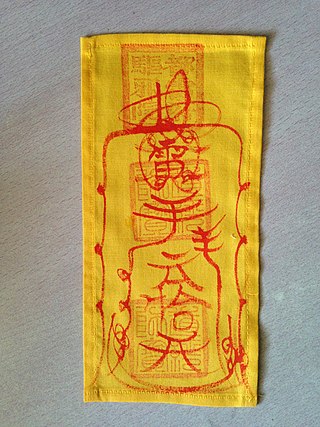
https://commons.wikimedia.org/wiki/Category:Taoist_magic_writing |
|
talisman of wind chimes |
|

|
|
bell |
|

|
|
amulet showing Gorgon head |
|

|
|
curtains with five colours representing the Five Tathāgatas |
|

|
|
ritual flaying knife |
|

|
|
talisman; originally used for protecting horse hoofs |
|

|
|
ritual scepter; originally used by officials as tablet for recording notes and orders |
|

https://commons.wikimedia.org/wiki/Category:Hu_(ritual_baton) |
|
gate |
|

|
|
totem pole |
|

|
|
prayer beads |
|

https://commons.wikimedia.org/wiki/Category:Mala_(prayer_beads) |
|
wooden divination tools |
|

|
|
toad figurine that brings good fortune |
|

|
|
bells on a stuff used in kagura dances |
|
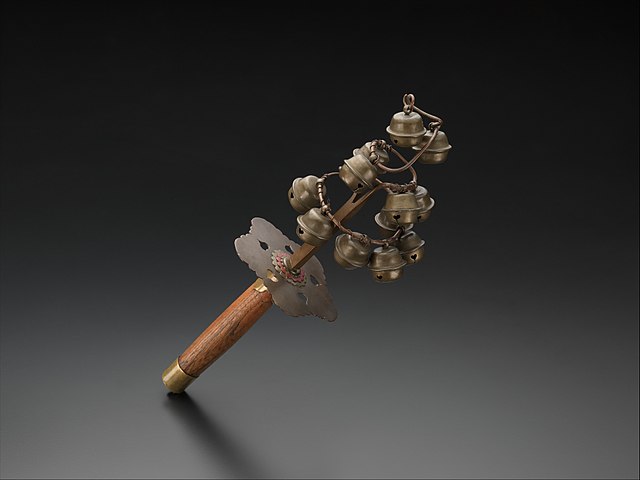
|
|
staff |
|

|
|
amulet against the evil eye |
|

|
|
prayer wheel |
|

|
|
banner |
|

|
|
single-edged curved knife that is part of the religious uniform |
|

|
|
footed cup for ceremonies |
|

|
|
cat figurine with a swaying arm that brings good fortune |
|

|
|
stone plates inscribed with “Oṃ maṇi padme hūm̐” |
|
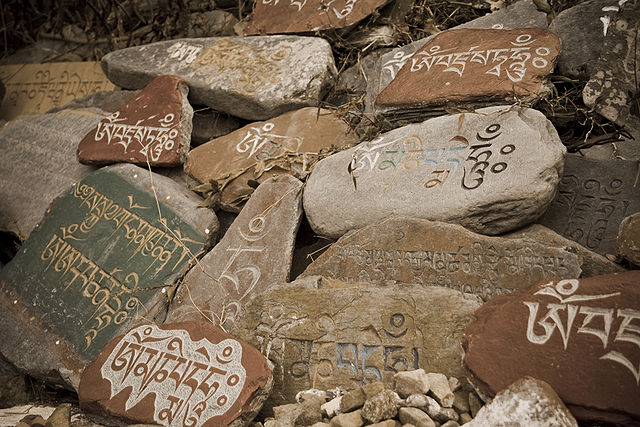
|
|
door gods that protect against evil influences |
|

|
|
seven-branched candelabrum; symbol of Judaism |
|

|
|
devotional image |
|

|
|
musical instrument of woodblock |
|

https://commons.wikimedia.org/wiki/Category:Wooden_fish_(percussion_instrument) |
|
hammer of Þórr; amulet |
|

|
|
pulpit |
|

|
|
niche that indicates the qibla |
|

|
|
amulet against the evil eye |
|

|
|
two-story gate |
|

|
|
object that a spirit inhabits |
|

|
|
talismanic slip |
|

|
|
amulet |
|

|
|
amulet that returns to an upright position after being pushed; symbol of perseverance and resilience |
|

https://commons.wikimedia.org/wiki/Category:Okiagari-koboshi |
|
wooden wand for ritual purification |
|

|
|
divination tray |
|

|
|
landmark and shrine |
|

|
|
alms bowl |
|

https://commons.wikimedia.org/wiki/Category:Buddhist_alms_bowls |
|
amulet |
|

|
|
pulpit |
|

|
|
cushion for meditation |
|

|
|
container to carry the Eucharist |
|

|
|
musical instrument of an inverted bell |
|

|
|
sacred altar |
|

|
|
prayer flags with five colours representing the Five Tathāgatas |
|

|
|
prayer beads |
|

|
|
tower gate |
|

|
|
ceremonial scepter (Hàn Buddhism); talisman symbolising power and good fortune (Chinese folklore) |
|

|
|
votive sticker with the name of a worshipper on it |
|

|
|
gate |
|

|
|
zigzag-shaped paper streamers |
|

|
|
stone tablet with writing “shígǎndāng”, placed at spiritually dangerous places to exorcise evil spirits |
|
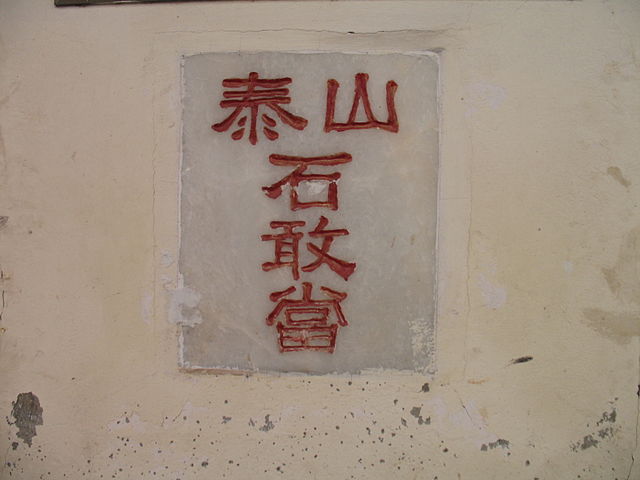
|
|
laid rice straw or hemp rope used for ritual purification |
|

|
|
mound containing remains of monks or nuns |
|

|
|
prayer beads |
|
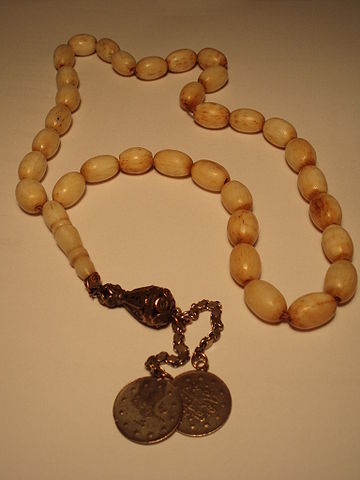
|
|
pagoda where the second story has a balustrade |
|

https://commons.wikimedia.org/wiki/Category:Tah%C5%8Dt%C5%8D |
|
prayer shawl |
|

|
|
gate |
|

|
|
decorated sakaki-tree branch as an offering |
|

|
|
statue of ancestors |
|

|
|
doll that brings sunny weather |
|
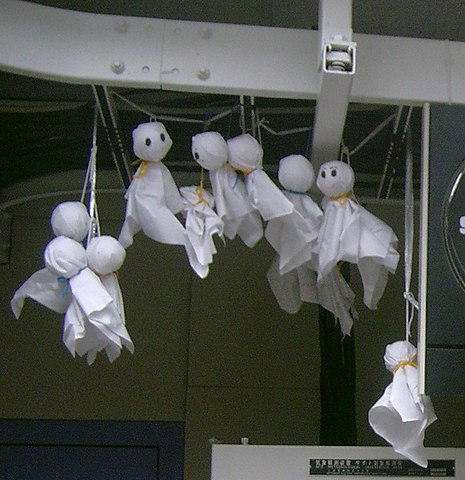
https://commons.wikimedia.org/wiki/Category:Teru_teru_b%C5%8Dzu |
|
box with straps containing scrolls |
|

|
|
gate |
|

|
|
gate to a shrine |
|

|
|
amulet |
|

|
|
ritual fringes |
|

|
|
sacred wood or stone |
|
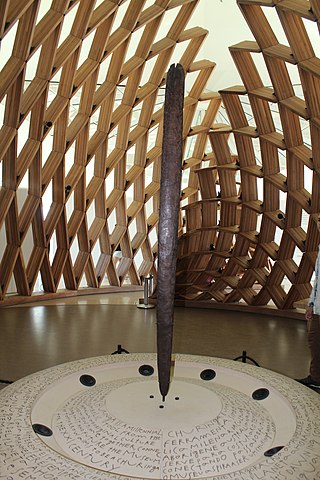
|
|
censer suspended from chains |
|

|
|
decorative and ritual cloth |
|

|
|
hitching post, property marker, ritual pole |
|

|
|
fly whisk for ritual purification |
|

|
|
ceremonial mace |
|
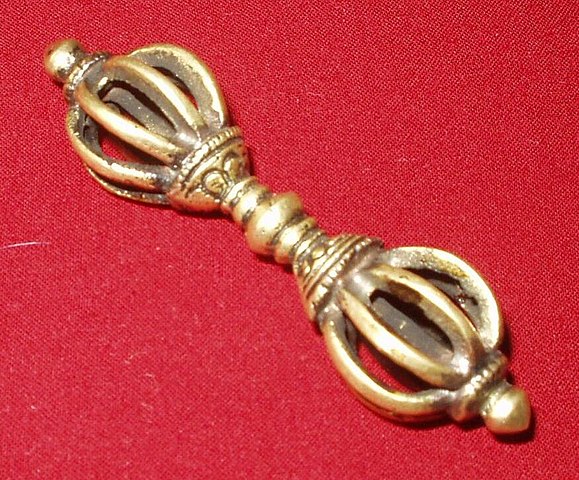
|
|
a censer, a pair of vases and a pair of candlesticks, used at an offering |
|

|
|
censer |
|

|
Specific[edit | edit source]
| object | description | religion/folklore |
|---|---|---|
|
wooden chest that contained Tablets of the Law |
|
|
sword of Ali ibn Abi Talib |
|
|
sword of King Arthur |
|
|
sacred bow |
|
|
double-edged sword; imperial regalia |
|
|
magic sword |
|
|
boat where Noah, his family and selected creatures survived a global flood |
|
|
sword of Huángdì |
|
|
jade; imperial regalia |
|
|
mirror; imperial regalia |
|

| Beings | Concepts | Events | Figures | Locations | Objects | Practices |